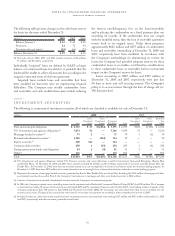American Express 2008 Annual Report Download - page 78
Download and view the complete annual report
Please find page 78 of the 2008 American Express annual report below. You can navigate through the pages in the report by either clicking on the pages listed below, or by using the keyword search tool below to find specific information within the annual report.notes to consolidated financial statements
american express company
76
acquisition adjustments to the fair value recorded through
earnings, and (4) any non-controlling interests’ share of
earnings in a partially owned subsidiary are included in the
consolidated net income of the group.
• SFAS No. 160, “Noncontrolling Interests in Consolidated
Financial Statements” (SFAS No. 160), which is to be
retrospectively applied for presentation and disclosure
purposes, requires entities to include non-controlling
(minority) interests in partially owned consolidated
subsidiaries within shareholders’ equity in the consolidated
financial statements. All amounts related to non-controlling
interests are presented separately on the face of the financial
statements. SFAS No. 160 also requires the consolidating
entity to include, prospectively, all earnings of the consolidated
subsidiary attributable to the non-controlling interest holder
in its income statement with an offsetting charge (credit) to
the non-controlling interest in shareholders’ equity.
• SFAS No. 161, “Disclosures about Derivative Instruments
and Hedging Activities – an amendment of FASB Statement
No. 133” (SFAS No. 161), amends and expands the disclosure
requirements of FASB Statement No. 133, “Accounting for
Derivative Instruments and Hedging Activities” (SFAS
No. 133) requiring enhanced disclosures about the Company’s
derivative and hedging activities. Under SFAS No. 161, the
Company is required to provide disclosures about (a) how
and why it uses derivative instruments, (b) how derivative
instruments and related hedged items are accounted for under
SFAS No. 133 and its related interpretations, and (c) how
derivative instruments and related hedged items affect the
Company’s financial position, results of operations, and cash
flows. SFAS No. 161 is effective prospectively, and applies
to derivative instruments existing at the reporting date, with
comparative disclosures of earlier periods encouraged upon
initial adoption.
• EITF No. 07-1, “Accounting for Collaborative
Arrangements” (EITF 07-1), which is to be retrospectively
applied, defines collaborative arrangements as those
that do not involve a separate legal entity and in which
the participants are actively involved and are exposed to
significant risks and rewards that depend on the ultimate
commercial success of the endeavor. EITF 07-1 also clarifies
that the equity method of accounting should not be applied
and requires the disclosure of the Company’s accounting
policies regarding income statement characterization,
the amounts and income statement classification of the
arrangements and information about the nature and purpose
of the arrangements.
• FSP No. FAS 142-3, “Determination of the Useful Life
of Intangible Assets” (FSP FAS 142-3), removes the
requirement within SFAS No. 142 “Goodwill and Other
Intangible Assets” for an entity to consider, when determining
the useful life of a recognized intangible asset, whether an
intangible asset can be renewed without substantial cost or
material modifications to the existing terms and conditions.
FSP FAS 142-3 requires an entity to consider its own
historical experience in developing renewal or extension
assumptions, or assumptions that a marketplace participant
would use about renewal or extension.
• FSP FAS 157-2, as described above, delays the effective date
of SFAS No. 157 for non-financial assets and non-financial
liabilities, except for items that are recognized or disclosed at
fair value in the Company’s financial statements on a recurring
basis (at least annually), until January 1, 2009.
In addition to the above, the FASB also recently issued the
following accounting standard, which is effective for the year
ending December 31, 2009, the adoption of which will not
have a material impact on the Company’s financial position or
results of operations.
• FSP No. FAS 132(R)-1, “Employers’ Disclosures about
Postretirement Benefit Plan Assets” (FSP FAS 132(R)-1),
amends SFAS 132 (revised 2003), “Employers’ Disclosures
about Pensions and Other Postretirement Benefits,” to provide
guidance on an employer’s disclosures about plan assets of a
defined benefit pension or other postretirement plan. These
disclosures include: how investment allocation decisions
are made, including the factors that are pertinent to an
understanding of investment policies and strategies, the major
categories of plan assets, the inputs and valuation techniques
used to measure the fair value of plan assets, the effect of
fair value measurements using significant unobservable
inputs (Level 3) on changes in plan assets for the period and
significant concentrations of risk within plan assets.
























